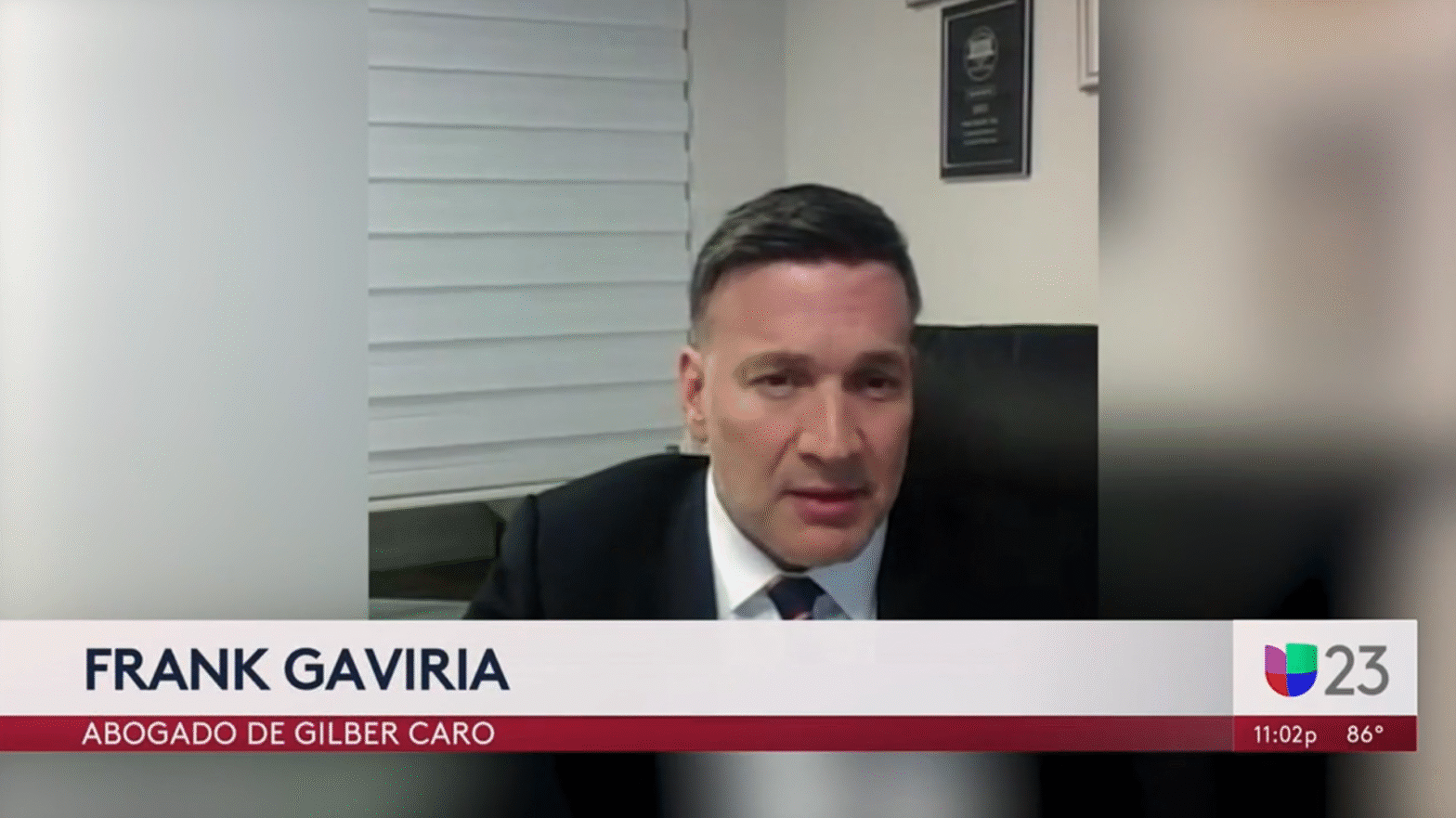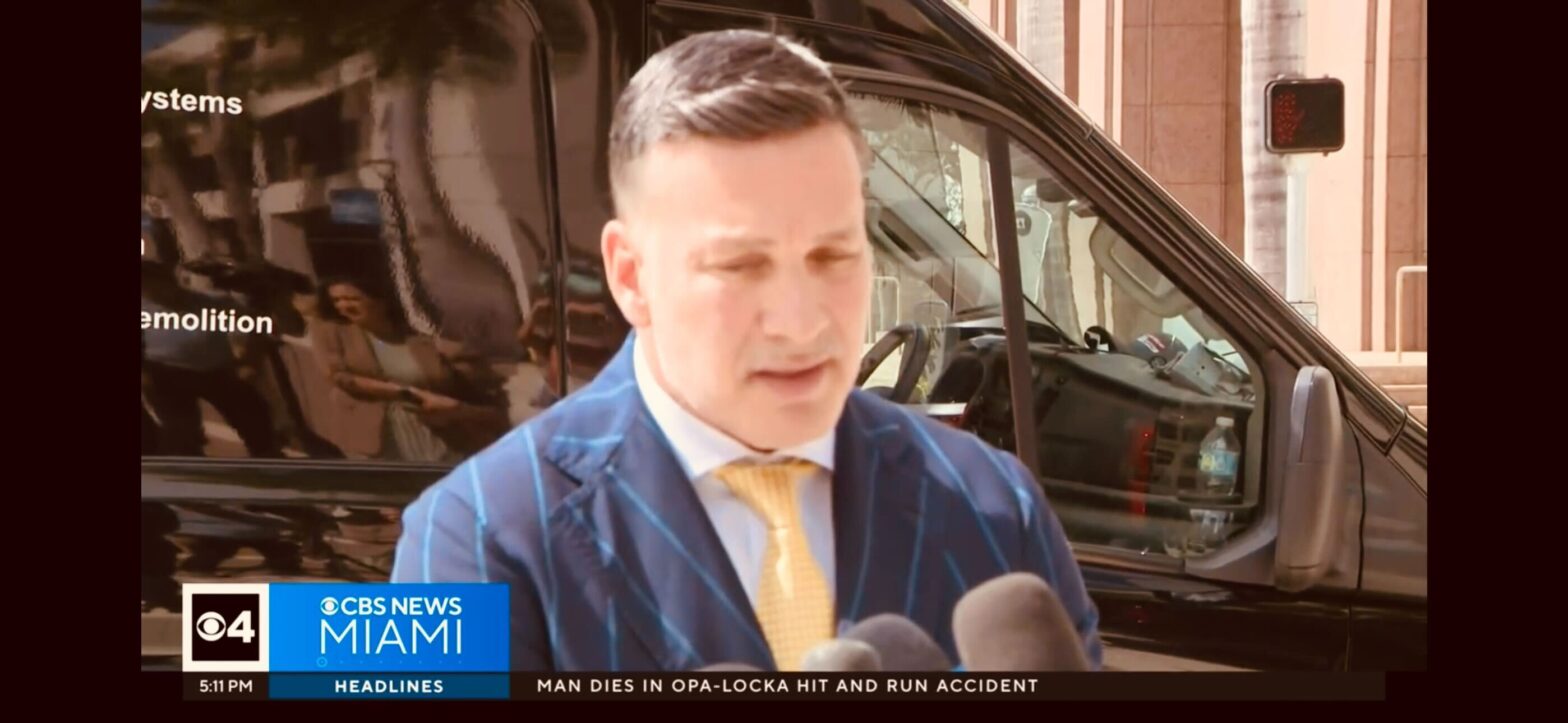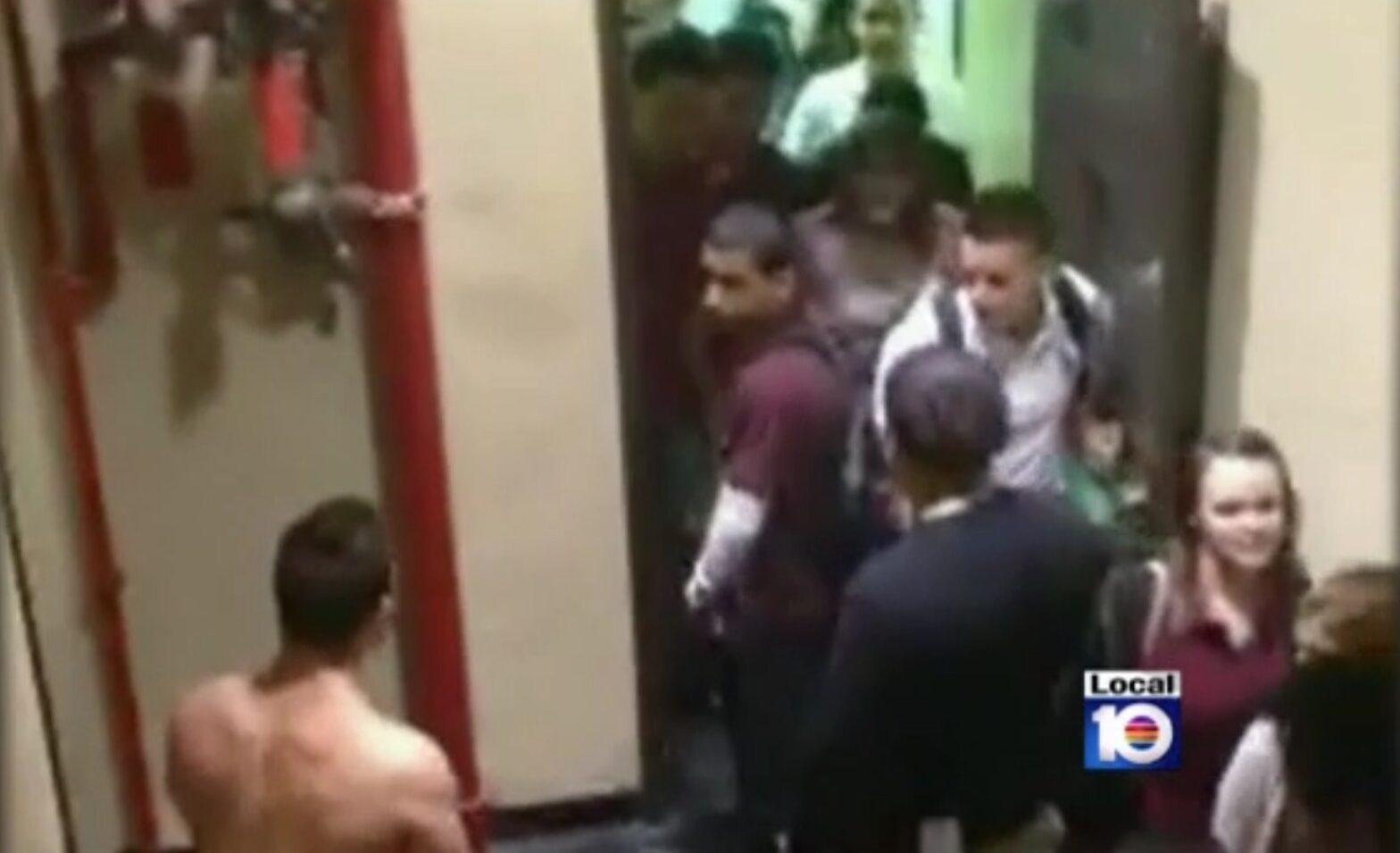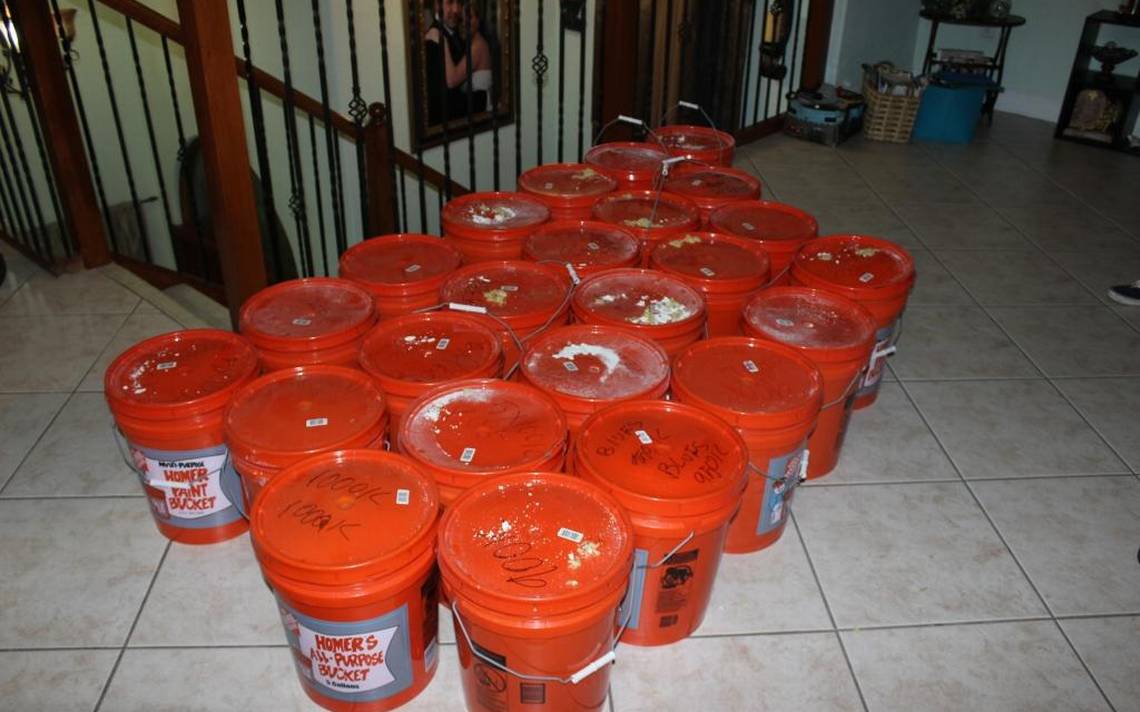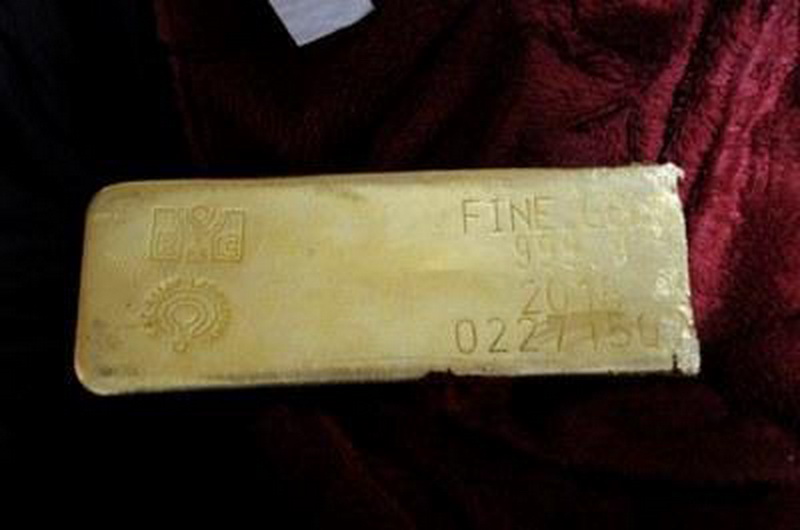Defending the Rights of the Accused: A Commitment to Justice May 4, 2025 digital In a recent high-profile arrest, two Venezuelan nationals under Temporary Protected Status (TPS) were charged in South Florida in connection with an alleged scheme to defraud the Paycheck Protection Program (PPP). The male defendant, now facing serious federal allegations, is being represented by renowned criminal defense attorney Frank Gaviria. Mr. Gaviria and his legal team are committed to ensuring that the rights of the accused are fully respected and that the case proceeds with the transparency and fairness our legal system demands. As always, we remind the public that an accusation is not a conviction — and every person deserves a vigorous and principled defense. Click below to read the full article and learn more about the case and our ongoing efforts to defend the rights of those facing serious legal challenges. Read More Latest Posts Defending the Rights of the Accused: A Commitment to JusticeMay 4, 2025 New Developments in Gilber Caro’s Case: The Defense RespondsApril 18, 2025 Pre-trial detention hearing delayed for man accused in disappearance of Doral mother, daughterNovember 3, 2024 School fight caught on cameraAugust 18, 2023 Archive February 2018 July 2017 June 2017 November 2016 October 2016 March 2016 February 2016 April 2014 March 2013 June 2012 March 2012
Autor: digitales
New Developments in Gilber Caro’s Case: The Defense Responds
New Developments in Gilber Caro’s Case: The Defense Responds April 18, 2025 digital On September 2, 2024 a tragic three-car crash in Miami resulted in one fatality and new claims by authorities that Gilber Caro ran a red light. Previously, it was believed the victim had caused the accident. However, new footage from a third vehicle has shifted that narrative. The defense maintains that Mr. Caro is entitled to due process, and cautions the public against jumping to conclusions before all facts are presented in court. Recent media reports suggest that former Venezuelan congressman Gilber Caro may have been involved in a fatal traffic incident in Miami. While initial assumptions placed blame elsewhere, authorities now claim new video evidence points to Mr. Caro. But let’s be clear—accusations are not convictions. Frank Gaviria and the defense team stress that all evidence must be properly reviewed in court, not judged in headlines. Read the full article and stay informed: Click here to view the article on Univision Latest Posts New Developments in Gilber Caro’s Case: The Defense RespondsApril 18, 2025 Pre-trial detention hearing delayed for man accused in disappearance of Doral mother, daughterNovember 3, 2024 School fight caught on cameraAugust 18, 2023 Cops took $22 million cash stuffed in buckets from his home. But he won’t lose it all.February 7, 2018 Archive February 2018 July 2017 June 2017 November 2016 October 2016 March 2016 February 2016 April 2014 March 2013 June 2012 March 2012
Pre-trial detention hearing delayed for man accused in disappearance of Doral mother, daughter
Pre-trial detention hearing delayed for man accused in disappearance of Doral mother, daughter Miami-Dade County investigators have not found the bodies of an 8-year-old girl and her 42-year-old mother after they vanished in 2016. Gustavo Castaño Restrepo, 55, was found guilty of kidnapping resulting in death eight years later. Castaño Restrepo had scratches on his arm when he told Doral detectives after a failed welfare check in 2016. Miami-Dade detectives later learned that Castaño had fathered Daniela during an extramarital affair and kept her a secret from most of his family. He admitted to going to a warehouse where a burglar stole surveillance video. Castaño Restrepo is currently in Miami federal court, with his loved ones supporting him. FBI Special Agent Dave Clancy offered a $25,000 reward and cooperated with law enforcement agencies in Colombia. Castaño Restrepo is facing two counts of kidnapping resulting in death. #More here: https://www.local10.com/news/local/2024/11/01/father-arrested-8-years-after-his-daughter-and-her-mother-vanished-appears-in-miami-federal-court/ https://www.cbsnews.com/miami/video/pre-trial-detention-hearing-delayed-for-man-accused-in-disappearance-of-doral-mother-daughter/ Latest Posts Pre-trial detention hearing delayed for man accused in disappearance of Doral mother, daughterNovember 3, 2024 School fight caught on cameraAugust 18, 2023 Cops took $22 million cash stuffed in buckets from his home. But he won’t lose it all.February 7, 2018 10th Sentence Handed Down In Fla. Health Care Fraud CaseJuly 20, 2017 Archive February 2018 July 2017 June 2017 November 2016 October 2016 March 2016 February 2016 April 2014 March 2013 June 2012 March 2012
Pelea escolar captada por la cámara
School fight caught on camera MIAMI LAKES, Fla. – The attorney representing a high school senior accused of stabbing another student during a fight says cellphone video proves his client was acting in self-defense. WATCH: Cellphone video captures fight “You’ve got a student lying in wait to attack another student,” said defense attorney Frank Gaviria. Gaviria’s client, Frank Acosta, 18, is accused of stabbing Mauricio Padron, 17, at Barbara Goleman Senior High in Miami Lakes on February 7th. Gaviria released two cell phone video clips on Friday that showed the victim, Padron, acting like the aggressor. The video shows Padron, who has a large build, with his shirt off, waiting for Acosta at the stairwell after the two had an argument in the cafeteria. In the video, Acosta is seen trying to walk away but he cannot leave because the stairwell is so crowded. Padron lunges at Acosta. Acosta pulls out a small penknife and stabs Padron. Padron comes after Acosta again before the two are separated by other students. In a second video clip, Padron is seen walking to the school office with blood running down his back. Gaviria said his client kept the Swiss army penknife on his keychain. Acosta was charged with aggravated battery and having a weapon on school grounds. Padron was arrested a week later on lesser charges of battery and interfering with an educational institution. Gaviria said if his client is convicted, he faces up to 20 years in prison, but he does not think that will happen. “I believe that ultimately justice will prevail and the charges will be dropped. Rather than him being called the defendant he will be labeled the victim which he truly is,” said Gaviria. local10.com Latest Posts School fight caught on cameraAugust 18, 2023 Cops took $22 million cash stuffed in buckets from his home. But he won’t lose it all.February 7, 2018 10th Sentence Handed Down In Fla. Health Care Fraud CaseJuly 20, 2017 Man identified as Colombian judge accused in arms-shipment case in MiamiJune 11, 2017 Archive February 2018 July 2017 June 2017 November 2016 October 2016 March 2016 February 2016 April 2014 March 2013 June 2012 March 2012
Los policías se llevaron 22 millones de dólares en efectivo metidos en cubos de su casa. Pero no lo perderá todo.
Cops took $22 million cash stuffed in buckets from his home. But he won’t lose it all. The Miami Lakes man found with $22 million in suspected marijuana cash stuffed in orange buckets inside his house pleaded guilty Wednesday — but he won’t be losing all his money to the feds. Luis Hernandez-Gonzalez agreed to let the U.S. government take $18 million of the cash. He’ll get to keep about $4 million, plus his house, his business and five Rolex watches. The 46-year-old pleaded guilty Wednesday in federal court to money laundering and structuring bank deposits to avoid reporting the true amounts to the government. U.S. Judge Robert Scola will sentence Hernandez-Gonzalez on April 20 — ironically, the annual day marijuana fans celebrate the herb. He faces up to 30 years in prison, but his defense lawyers are hoping to get him a sentence below the bottom of the sentencing guidelines, which is five years behind bars. Hernandez-Gonzalez made national news when detectives raided his Miami Lakes home in June 2016, discovering most of the cash in 24 orange “Homer’s All-Purpose” buckets from Home Depot. They were hidden in a secret compartment above a closet. An additional $600,000-plus was found at his business. The story was first reported by the Miami Herald. Miami-Dade narcotics detectives hauled away the money in a pickup truck, then spent more than a day exhaustively counting the huge stacks of bills. Investigators raided his businesses and home after he was caught on a phone wiretap giving growing advice to Miami marijuana growers arrested by federal agents in Tennessee. Hernandez-Gonzalez is well-known in the marijuana trade. He ran Blossom Experience, a North Miami-Dade store that sells fans, lights, fertilizers and other equipment for indoor gardening. Cops believe that the business, while legal, caters to marijuana traffickers growing weed in clandestine labs inside homes. But his defense lawyers long insisted the money was legitimately earned from selling equipment. However, because he sells to legal marijuana growers in other states, no banks would take his cash, they claimed. Hernandez-Gonzalez was first charged in state criminal court for marijuana trafficking and money laundering. A few months after his arrest, a federal grand jury indicted him on federal charges stemming from the same cash seizure. www.miamiherald.com Latest Posts School fight caught on cameraAugust 18, 2023 Cops took $22 million cash stuffed in buckets from his home. But he won’t lose it all.February 7, 2018 10th Sentence Handed Down In Fla. Health Care Fraud CaseJuly 20, 2017 Man identified as Colombian judge accused in arms-shipment case in MiamiJune 11, 2017 Archive February 2018 July 2017 June 2017 November 2016 October 2016 March 2016 February 2016 April 2014 March 2013 June 2012 March 2012
Décima sentencia dictada en caso de fraude en atención médica en Florida
Law360, Miami (July 20, 2017, 9:51 PM EDT) — A federal judge in Miami has sentenced the last of 10 South Florida assisted living facility owners charged last year for conspiring with a local pharmacy to defraud Medicare and Medicaid, according to the U.S. Department of Justice and court records. U.S. District Judge Marcia G. Cooke sentenced Maribel Galvan, 43, of Miami Lakes, on July 12 to one year and one day of imprisonment to be followed by three years of supervised release. She also ordered her to pay $12,000 in restitution, the DOJ said Wednesday in an announcement of the case’s completion. Another federal judge last week also reduced the sentence of the former owner of the pharmacy at the center of the scheme for her cooperation in fraud investigations. Federal prosecutors in October charged Maria Serrano, the former owner and administrator of Hialeah-based Florida Pharmacy, with conspiring to steal government money and property, and in a separate case charged the assisted living facility owners, whom Serrano paid bribes and kickbacks in exchange for referring residents who were Medicare and Medicaid beneficiaries to her business. As part of the scheme, Serrano also accepted returned prescription drugs that had already been paid for by Medicare and Medicaid, purportedly for use by the assisted living facility residents, and, with her co-conspirators, resold the drugs. Prosecutors at the time described the scheme as “a serious crime that has become an ever-increasing problem in South Florida.” Galvan and the nine other assisted living facility owners had previously pled guilty to conspiring with Florida Pharmacy to receive kickbacks and bribes in exchange for referring beneficiaries who were living in their facilities to file claims for prescription medication and medical equipment with Medicare and Medicaid, the DOJ said. The assisted living facility owners’ participation violated their Medicaid provider agreements as well as federal and state anti-kickback rules and regulations, according to the DOJ. Judge Cooke issued prison sentences ranging from eight months to one year and one day for nine of the 10 defendants: Galvan; Marlene Marrero, 60, of Miami; Norma Casanova, 67, of Miami Lakes; Yeny De Erbiti, 51, of Miami; Rene Vega, 57, of Miami; Dianelys Perez, 34, of Miami Gardens; Osniel Vera, 47, of Hialeah; Alicia Almeida, 56, of Miami Lakes; and Jorge Rodriguez, 57, of Hialeah, according to the DOJ and court records. The 10th defendant, Blanca Orozco, 69, of Miramar, was sentenced to home confinement. All of the defendants were also ordered to serve three years of supervised release and pay restitution, and are subject to forfeiture judgments, the DOJ said. Their businesses included Senior’s Palace Inc., Soby Group Homes, four locations run by Casanova ALF, Paradise Adult Center Inc., Ailin Living Facility Inc., Vega’s ALF Corp., Ambars Group Home Corp., PM Adult Home Corp., La Reina ALF Corp., Home My Family Inc., Alelise ALF Corp. and Julia Home Health Care Inc. U.S. District Judge Jose E. Martinez sentenced Serrano in February to 30 months in prison followed by three years of supervised release and ordered her to pay more than $1.2 million in restitution. Last Friday, he granted a motion to reduce her sentence, amending her prison term to one year and one day. Prosecutors suggested a 50 percent reduction would be fair and appropriate in light of Serrano’s decision to cooperate and provide “substantial and extensive assistance” in the prosecution of others involved in Medicaid and Medicare fraud. “While it does not excuse the very serious crime that Maria Serrano and her co-conspirators committed, the reduction does recognize and reward the willingness of Maria Serrano to cooperate and provide truthful testimony that agents could use and did use to prosecute others, conduct that hopefully other defendants will emulate in the future,” prosecutors told the court. Serrano’s counsel told Law360 that he would characterize her cooperation as unprecedented. “She is looking forward to put all of this behind her and get back to her family,” Adam Schwartz of Homer Bonner Jacobs said Thursday. Attorneys for the various assisted living facilities’ defendants did not immediately respond to requests for comment Thursday. Both cases were prosecuted by Hagerenesh K. Simmons of the U.S. Attorney’s Office for the Southern District of Florida. Marrero is represented by Jacob M. Denaro and by Moises Thomas Grayson of Blaxberg Grayson Kukoff & Twombly PA. Orozco is represented by Lawrence E. Besser of Samek & Besser and Abe Koss. Casanova and Perez are represented by Roy Jeffrey Kahn. De Erbiti is represented by the Law Office of Michael Mirer PA. Vega is represented by Frank J Gaviria PA. Galvan is represented by Roger Cabrera PA. Vera is represented by Matthew Eric Ladd. Almeida is represented by Carlos Fernando Gonzalez of Rimon PC. Rodriguez is represented by Elio Vazquez. Serrano is represented by Adam Schwartz of Homer Bonner Jacobs. The cases are USA v. Marrero et al., case number 1:16-cr-20799, and USA v. Serrano, case number 1:16-cr-20786, both in the U.S. District Court for the Southern District of Florida. –Editing by Alanna Weissman. law360.com Latest Posts School fight caught on cameraAugust 18, 2023 Cops took $22 million cash stuffed in buckets from his home. But he won’t lose it all.February 7, 2018 10th Sentence Handed Down In Fla. Health Care Fraud CaseJuly 20, 2017 Man identified as Colombian judge accused in arms-shipment case in MiamiJune 11, 2017 Archive February 2018 July 2017 June 2017 November 2016 October 2016 March 2016 February 2016 April 2014 March 2013 June 2012 March 2012
Identifican a hombre como juez colombiano acusado en caso de envío de armas en Miami
Miguel Horacio Gómez Achicue, identified in Colombian news reports as a judge in Cali, was arraigned in Miami federal court last week and pleaded not guilty in a case involving the shipment of parts for AR-15 rifles. The next step is the trial, which has not been scheduled yet. The case attracted renewed attention after the Colombian news outlet Noticias Caracol identified Gómez Achicue as a labor court judge in Cali, a major Colombian city southwest of Bogotá, the capital. Labor courts resolve disputes between employees and employers. U.S. Immigration and Customs Enforcement issued a detainer against Gómez Achicue, who was arrested at Miami International Airport after being accused of sending “defense articles” to Colombia. Even if he got bail, he would still be sent to the Krome detention center for immigrants to await trial, according to court records. Gómez Achicue, 49, asked for bail, but Judge Andrea Simonton denied it, citing risk of flight. Last Monday, Gómez Achicue appeared in court again, this time before Judge John O’Sullivan, to plead not guilty through his lawyer Frank Gaviria. He told el Nuevo Herald that he would consider commenting in the future. A Homeland Security Investigations spokesman said he could not comment because the case was under investigation. The case came to light May 17 when Colombian authorities notified their U.S. counterparts that they had discovered parts of the AR-15 semiautomatic rifle hidden in a package shipped from Pembroke Pines to Cali, according to a criminal complaint filed by a special agent of HSI, a unit of ICE. The AR-15 resembles the military version known as M16. “The firearm parts were concealed in the package, which also contained clothing and shoes,” according to the criminal complaint. “The airway bill on the package revealed that the package was sent by Gómez Achicue on or about May 15, 2017, through Envios Pembroke, a shipment center located in Pembroke Pines.” The parts included bolt carrier groups, flash suppressors, lower parts kits, a butt stock, and a hand guard, according to the affidavit. The day after that first alert, authorities were notified by the same shipping company that Gómez Achicue had just dropped off another package to be sent to Cali. Two days later, on May 20, Gómez Achicue went to MIA to board a flight to Colombia, according to the criminal complaint. Shortly before boarding the flight to Bogotá, federal agents detained Gómez Achicue and during a subsequent check of his baggage discovered more parts of an AR-15 , according to the complaint. After being arrested, the complaint says, “Gómez Achicue stated he shipped the three intercepted packages containing firearms parts, he knew there were firearm parts in the packages, and he shipped the firearm parts in three separate packages in order to ‘avoid problems.’” Gómez Achicue also said that “he knew exporting firearm parts was ‘incorrect,’” the complaint says. Furthermore, it adds, “Gómez Achicue stated his friend asked him to ship the firearm parts to Colombia and that his friend had given him $1,500 to be used to purchase the firearm parts.” miamiherald.com Latest Posts School fight caught on cameraAugust 18, 2023 Cops took $22 million cash stuffed in buckets from his home. But he won’t lose it all.February 7, 2018 10th Sentence Handed Down In Fla. Health Care Fraud CaseJuly 20, 2017 Man identified as Colombian judge accused in arms-shipment case in MiamiJune 11, 2017 Archive February 2018 July 2017 June 2017 November 2016 October 2016 March 2016 February 2016 April 2014 March 2013 June 2012 March 2012
Hombre de Miami que escondió 22,6 millones de dólares en efectivo en cubos de Home Depot enfrenta cargos federales
Miami man who hid $22.6 million cash in Home Depot buckets faces federal charges The man found with $22.6 million in suspected marijuana cash stuffed in buckets inside his Miami Lakes home wants to start his trial in state court next month. Uncle Sam, however, wants him first. A federal grand jury has indicted Luis Hernandez-Gonzalez on money-laundering charges, prompting a U.S. district court judge last week to order that he be moved from a Miami-Dade county jail to a federal detention center. The decision prompted a legal showdown of sorts on Monday, as his defense lawyers rushed to court to try and convince a state judge to order that the Miami-Dade jail refuse federal authorities attempts to transport him. “There are important constitutional rights at stake,” defense lawyer Philip Reizenstein told the judge. “We have the law on our side. This stinks.” Miami-Dade Circuit Judge Nushin Sayfie, who heads the criminal division, was sympathetic but couldn’t do much. “Federal law is the supreme law of the land,” she said, adding: “I just don’t think I am the appropriate tribunal given where I fall in the pecking order.” His lawyers are planning to file an emergency appeal to the Third District Court of Appeal, a state court. The legal jockeying adds another twist to the high-profile saga of Hernandez-Gonzalez, who was arrested by Miami-Dade Police in June in a record-setting bust. Most of the cash was found in 24 orange “Homer’s all purpose buckets” from Home Depot, which were hidden in a secret compartment inside his Miami Lakes house. Miami-Dade police hauled away the money in a pickup truck, with narcotics detectives spending more than a day exhaustively counting the stash. The department released photos of the buckets hidden in the room – and the immense pile of cash once the bills were removed from the buckets. Hernandez-Gonzalez ran Blossom Experience, a North Miami-Dade store that sells fans, lights and other equipment for indoor gardening. Cops believe that the business, while legal, caters to marijuana traffickers growing weed in clandestine labs inside homes. Investigators raided his businesses and home after he was caught on a phone wiretap giving growing advice to Miami marijuana growers arrested by federal agents in Tennessee. But his defense team insists that the money was legitimately earned from selling equipment. However, because he sells to legal growers in other states, no banks would take his cash, they claim. Hernandez-Gonzalez remains jailed and is charged in state court with marijuana trafficking and money laundering. However, last month, federal authorities unsealed a grand-jury indictment stemming from the same cash seizure. He is accused federally of laundering the money and conducting illegal financial transactions to hide the money. A federal prosecutor, appearing by phone in state on Monday, could not say why the U.S. Attorney’s Office could not wait until the end of the state trial in December. “It’s unfortunate that it may cause a delay in the proceedings but we do have an interest in bringing him over here and prosecuting him federally,” federal prosecutor Elijah Levitt said. miamiherald.com Latest Posts School fight caught on cameraAugust 18, 2023 Cops took $22 million cash stuffed in buckets from his home. But he won’t lose it all.February 7, 2018 10th Sentence Handed Down In Fla. Health Care Fraud CaseJuly 20, 2017 Man identified as Colombian judge accused in arms-shipment case in MiamiJune 11, 2017 Archive February 2018 July 2017 June 2017 November 2016 October 2016 March 2016 February 2016 April 2014 March 2013 June 2012 March 2012
Los 22 millones de dólares en efectivo escondidos en cubos son legítimos, dicen los abogados defensores
$22 million cash hidden in buckets is all legit, defense lawyers say The Miami Lakes man who had $22.6 million cash stuffed in buckets inside a secret room says the money is all legit — earned from sales of equipment to legal marijuana growers in other states. Lawyers for Luis Hernandez-Gonzalez offered their defense in court as a Miami-Dade judge on Tuesday lowered his bond to $2 million. He remains jailed. “The prosecution of our client amounts to what we think is a war on marijuana and a war on legitimately earned cash,” defense lawyer Philip Reizenstein said after Tuesday’s hearing. The defense aired its strategy just weeks before trial for Hernandez-Gonzalez, who was arrested in June after Miami-Dade police, in a record-setting bust, found the suspected drug cash, most of it stuffed in 24 orange buckets inside his Miami Lakes house. Hernandez-Gonzalez, 44, remains jailed in a case that drew worldwide attention. He was originally being held on a $3 million bond. He is charged with money laundering and marijuana trafficking. Miami-Dade police hauled away the money in a pickup truck, with narcotics detectives spending more than a day exhaustively counting the money. The department released striking photos of the money hidden in the room — and the immense pile of cash once the bills were removed from the buckets. The police department has asked a Miami-Dade civil court to give the $22.6 million to the government under forfeiture proceedings. That legal fight is still ongoing. Hernandez-Gonzalez ran Blossom Experience, a North Miami-Dade store that sells fans, lights and other equipment for indoor gardening. Cops believe that the business, while legal, caters to marijuana traffickers growing weed in clandestine labs inside homes. Investigators raided his businesses and home after he was caught on a phone wiretap giving growing advice to Miami marijuana growers arrested by federal agents in Tennessee. Medical marijuana is legal in 25 states. Four states plus the District of Columbia have legalized the drug for recreational use. Defense lawyers Reizenstein and Frank Gaviria told a Miami-Dade judge this week that the equipment sales were all legal. But his customers in other states had to pay him in cash because federally sanctioned banks won’t take their money — and in turn, South Florida banks closed his accounts because they deemed his deposits suspicious, the lawyers said. “That’s why this money was in the buckets,” Reizenstein told the court. He said financial records will prove the money is clean. “We can show where this money came from. Purchase orders, sales, shipping records, they are going to see $50-60-70 million worth of orders, legitimate,” Reizenstein said. But Miami-Dade prosecutor Helen Page Schwartz said three witnesses have come forward to say that Hernandez-Gonzalez used to set up illegal marijuana grow houses, then as his business grew, he began selling his customers equipment at a reduced cost in turn for buying the drug cheaply. Selling to hydroponics labs purportedly growing vegetables is just a front for the dirty money, she said. “Sixty … seventy million … that’s a lot of money for cucumbers and tomatoes,” Page Schwartz said. miamiherald.com Latest Posts School fight caught on cameraAugust 18, 2023 Cops took $22 million cash stuffed in buckets from his home. But he won’t lose it all.February 7, 2018 10th Sentence Handed Down In Fla. Health Care Fraud CaseJuly 20, 2017 Man identified as Colombian judge accused in arms-shipment case in MiamiJune 11, 2017 Archive February 2018 July 2017 June 2017 November 2016 October 2016 March 2016 February 2016 April 2014 March 2013 June 2012 March 2012
Un hombre de Florida enfrenta cargos por atraco a un camión que se dirigía a Mass.
Fla. man faces charges in heist from truck headed for Mass. A Florida man orchestrated the heist of gold bars worth millions of dollars from a tractor trailer headed to Massachusetts last year by hatching an elaborate plan to force the crew to pull over in North Carolina, authorities said in court papers. The allegations against Adalberto Perez, 46, of Opa Locka, Fla., were made public in papers unsealed Thursday in US District Court in Miami, where he is charged with masterminding the March 2015 robbery in North Carolina, in which three gunmen made off with $4.8 million in gold bars. Perez was ordered held Thursday on charges of conspiring to commit the robbery and to possess a gun to further the crime, pending a detention hearing scheduled for Tuesday. He did not enter a plea. His lawyer, Frank J. Gaviria, declined to discuss the specific allegations but said Perez intends to “vigorously fight against these accusations.” According to a complaint filed in the case, the robbery of the truck belonging to the Miami-based shipping company TransValue Inc. occurred on March 1, 2015 on Interstate 95 in Wilson County, N.C. The truck was bound for the Bridgewater area, records show. A person identified only as a cooperating source told the FBI in January that Perez planned the caper and robbed the truck with two other men, the complaint said. The source had a “close, personal relationship” with Perez and lived with him for a time, records show. The source told agents that Perez indicated that before the robbery, he placed a GPS device under the trailer to track its location, and that he and his two accomplices also placed pepper spray inside the truck, the complaint said. Perez could release the pepper spray remotely, the source said, and the employees inside the truck stopped on the interstate because they began to feel sick. The robbers set upon the two employees at gunpoint and bound them before fleeing with the gold, records show. In addition, the thieves ignored containers of silver and went directly for the canisters of gold, suggesting they knew what they were looking for, according to legal filings. Perez told the source that the three men split the gold equally, and Perez began selling his share, using the proceeds to buy three Nissan vehicles, three homes, and a boat, according to the complaint. The records did not indicate how Perez allegedly gained access to the trailer before the robbery, and a spokeswoman for US Attorney Wifredo A. Ferrer declined to comment. It was not clear on Friday if prosecutors know the identities of the other two gunmen or if anyone else will be charged. In July, another man, Miguel Bovar, pleaded guilty to an extortion charge related to the robbery, records show. Jay Rodriguez, chief executive of TransValue, said in an e-mail that Perez is not a former employee, and the company is “looking into all possible scenarios.” bostonglobe.com Latest Posts School fight caught on cameraAugust 18, 2023 Cops took $22 million cash stuffed in buckets from his home. But he won’t lose it all.February 7, 2018 10th Sentence Handed Down In Fla. Health Care Fraud CaseJuly 20, 2017 Man identified as Colombian judge accused in arms-shipment case in MiamiJune 11, 2017 Archive February 2018 July 2017 June 2017 November 2016 October 2016 March 2016 February 2016 April 2014 March 2013 June 2012 March 2012


